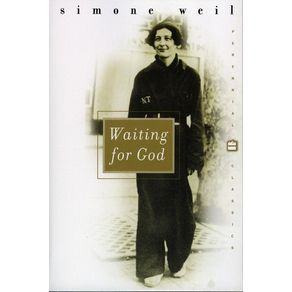Simone Weil is an outsider's saint. The daughter of an agnostic French family of Jewish descent, Weil was never baptized ("God does not want me in the Church," she wrote), and her conversion to Christianity at the age of 23 took her by surprise. Until then, she had been a solemn, committed leftist intellectual. Now she was moving toward a life of divine encounters whose desolate ecstasy, as described by the journals, letters, and essays excerpted in Waiting for God, bear comparison to St. John of the Cross and Teresa of Avila. As Leslie Fiedler writes in her introduction to Weil's book, "She speaks of the problems of belief in the vocabulary of the unbeliever, of the doctrines of the Church in the words of the unchurched." The book is mostnotable for Weil's lengthy letter titled "Spiritual Autobiography" and for her "Meditation on the Pater Noster," which is the discursive record of a spiritual process that led to her almost daily attainment of a mystical vision of God. This is not pretty writing; it is an agonized record of amazement.

